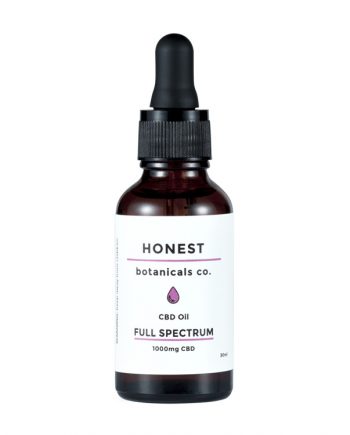The pain-relieving effects of CBD
Whether it’s acute, localized, or chronic, pain is something we all experience at some point.
In fact, pain is becoming a larger part of our lives. According to the CDC, over 20% of US adults now deal with pain on a regular basis.
Pain is often caused by injury, degeneration, or infection, and can be worsened by inflammation in muscular tissues.
To treat pain, many rely upon pharmaceutical medications such as opioids, which can provide very strong relief. However, they also come with unwanted side effects, risk of addiction, and don’t help to reduce underlying inflammation.
CBD is a natural, non-intoxicating plant extract that has been shown to reduce pain and inflammation, without the negative effects of traditional meds.
What’s on this page?
Here’s our 2021 guide to using CBD oil to treat pain and inflammation, including the science of CBD, common user questions, and our recommendations for the best CBD oil for pain relief.

Quick read: CBD Oil for Pain Management
- CBD oil helps relieve pain by blocking the breakdown of anti-inflammatory and pain-relieving compounds in the body.
- Because it also possesses antibacterial properties, CBD can aid the healing process from infection.
- Broad spectrum CBD and full spectrum CBD oils contain further cannabis compounds in addition to CBD. These include cannabinoids like THC, CBC, and CBG.
- Other cannabis compounds possess their own pain-fighting abilities within the body. THC is known to alleviate pain sensations, while CBC and CBG can reduce internal inflammation and pressure.
So – does CBD oil really work for pain?
Yes! Evidence from both scientists and the general public is now widely available to support CBD’s pain-reducing credentials. There are millions of global consumers who use CBD as part of their daily wellness routine.
Cannabis products that contain CBD, alongside THC and other compounds, are being prescribed by doctors to help soothe pain associated with diseases and long-term conditions, while naturopaths and other natural medicine experts recommend CBD to reduce inflammation.
Dozens of clinical trials featuring CBD have been carried out on humans and animals. When researching the effects of CBD on conditions such as Parkinson’s, cancer, and arthritis, scientists have noted CBD’s ability to reduce pain when compared to a placebo.
Regular CBD users also highlight the lack of intoxication, addiction, and other unwanted side effects in comparison to pharmaceutical pain treatment options.
The serious science
How does CBD treat pain?
CBD interacts with a wide range of proteins in the body and central nervous system, including components of the endocannabinoid system located in the brain and across the immune system.
CBD inhibits the absorption of anandamide, a molecule produced by our bodies that regulates pain and is associated with feelings of well-being and happiness. As a product of enhancing anandamide signaling in the bloodstream, CBD helps to reduce sensations of pain.
Research has found that CBD targets alpha-3 glycine receptors to increase their anti-inflammatory properties. Glycine receptors are an important component in pain sensitivity.
CBD also activates other receptor proteins, such as the vanilloid receptor TRPV1, which is responsible for controlling inflammation and the awareness of pain. In patients with rheumatoid arthritis, for example, the sensitivity and expression of TRPV1 receptors increases. A 2014 study published in the British Journal of Pharmacology found that CBD’s beneficial effects on the human body are mediated by this receptor.
Another study published in the journal Neurotoxicology found that CBD inhibits glutamate levels in the brain and spinal cord. High glutamate levels are associated with increased sensations of pain and transmission.
Notable studies on CBD and chronic pain and inflammation
A 2008 review of existing studies on CBD concluded that CBD was effective in managing pain without causing unwanted reactions.
In a 2014 double-blind trial, researchers found that a CBD/THC spray aided in the management of neuropathy pain in patients.
A 2016 study showed that CBD can reliably reduce inflammation. Research teams administered topical CBD on rats for 4-day periods.
In 2019, The Mayo Clinic issued a Clinicians’ Guide to cannabidiol and hemp seed oil, which highlights:
“a growing body of preclinical and clinical evidence to support the use of CBD oils…for treating challenging chronic pain.”
CBD for muscle pain/recovery
For localized pain (muscle spasms, arthritic pain, or pulled muscles), a topical CBD treatment can be very effective. CBD has a high permeability rate, meaning it’s easily absorbed into the skin. There are many types of creams and gels to help with topical absorption.
As an anti-catabolic, CBD also helps regulate how much cortisol is released into your system. By reducing the level of cortisol in your body post-workout, CBD oil allows protein synthesis and encourages muscle regeneration.
CBD for Nerve pain
For neuropathic pain, taking CBD oil sublingually (under the tongue) is recommended. Success in this area is really all about pinpointing the dose that works for you as an individual, as there is no one-dose-for-all with spectrum CBD.
We always recommend starting at a low dose and work your way up slowly until relief is found.
CBD for arthritis pain
Because pain associated with arthritis usually has an inflammatory base, CBD can have a significant soothing effect—and may even help to reduce the underlying inflammation that causes pain in the first place.
In more serious cases of arthritic pain, we recommend consuming THC alongside CBD to increase pain-reducing effects. Begin with a low amount and slowly increase your dosage to avoid a ‘high’.
CBD for cancer treatment relief
CBD decreases oxidative stress in the body. Oxidative stress occurs when there is a disturbance between the production of free radicals and antioxidant defenses, resulting in inflammation or tissue damage.
Oxidative stress can be a particular issue for cancer patients, both from the disease and its treatments. CBD possesses antioxidant properties and has been shown to markedly reduce oxidative stress and inflammation in the body following chemotherapy.
CBD oil and inflammation
CBD has been shown to reduce inflammatory pain in animal models by interacting with glycine receptors—a type of protein in our bodies. This protein plays a critical role in transmitting pain signals, especially across the spinal cord and into our brain where the pain is perceived.
What is the Best CBD oil for pain? Honest Botanicals Hemp CBD Oil
-
CBD Oil – No THC | Honest Botanicals
$26.99 – $149.99 Select options -
Full Spectrum CBD Oil | Honest Botanicals
$29.99 – $169.99 Select options
These isolate and full spectrum CBD oils from BC-based Honest Botanicals use the highest quality Canadian hemp to produce two products that have genuine credentials when it comes to reducing pain.
CBD oils are made in three varieties: isolate CBD oils contain only CBD, while broad spectrum and full spectrum CBD oils contain extra beneficial compounds from the cannabis plant, such as small amounts of THC.
All types of CBD have anti-inflammatory properties. However, we generally recommend the Honest Botanicals full spectrum option for most people looking to use CBD to combat pain. Try the Honest Botanicals isolate version if you’re looking for a CBD product with zero THC or other cannabis compounds.
- Both CBD Oils come in multiple sizes so that you can gain the best value for money for your usage needs. Choose from 250 mg, 500 mg, 1000 mg, and 2500 mg sizes.
- All reputable CBD companies submit their CBD extracts for independent testing in accredited labs. Check out the Lab Results for Honest Botanicals CBD to see exactly what goes into every bottle.
Honest Botanicals CBD: Customer reviews related to “pain”
“I usually take a full dropper or two just before bed and I’m out within a few minutes whereas it would take me at least an hour or longer to fall asleep. This has also helped relieve some of the arthritis and nerve pain that I’ve been having too…”
“I picked up a box of medical research books, twisted and put the box down, and then the pain began. They thought perhaps I had a compression fracture but it turned out to be a nerve problem. Three weeks of lying on the floor or the couch. None of the meds that were prescribed helped with the pain but the 500mg bottle of CBD Oil took most of the pain away…”
Find out more about Honest Botanicals CBD oil here >
How much CBD oil should I take for pain?
we usually recommend beginning with a 500 mg CBD oil, as it’s a good starting point from which to experiment and discover what dose works for you. Once you find your ideal dose, you can buy a stronger or weaker concentration accordingly.
For minor pain relief, it’s a good idea to start using between ten and fifteen mg of CBD oil daily. From there, many people move up to dosages as high as 50 mg, which are completely safe to take on a daily basis.
Read our CBD oil dosage guide for the full details on how to calculate your perfect CBD oil dose.
Will CBD oil be enough to manage my pain, or should I also use THC?
A full-spectrum CBD oil, which contains small amounts of THC, is recommended for almost all types of pain. In a full spectrum oil, all the parts of the cannabis plant work together in their natural ratios and are more powerful than one part of the plant working alone.
For those with severe or extreme chronic pain, a CBD oil that contains up to 1:1 parts THC may be more appropriate. High THC oils do cause intoxication but are much more effective at reducing pain.
Common CBD oil for pain questions
How long does it take for CBD oil to work?
It seems to take some time for CBD to work its way into your system. For some people, this can take up to 6 weeks—but most see results within 2 weeks.
It’s important to treat CBD as a natural supplement rather than a pharmaceutical drug, which means taking it every day as part of your routine, rather than a single dose at the point of need.
Higher-quality CBD is more likely to produce noticeable effects, so make sure you’re getting your CBD from a reputable company that is happy to provide you with third-party lab test results (such as all of the CBD that we carry here at CBD Oil Canada).
If you don’t feel sufficient relief after a multi-week period, you may need a dosage increase or to switch to a THC/CBD infusion.
How soon will I feel pain relief?
- If you’re taking full spectrum CBD products with high levels of THC, you may feel relief within 20 minutes to one hour of consumption.
- CBD isolates are unlikely to produce immediate relief, and instead require many doses to build up inside the body.
Will I get high when I take CBD for pain management?
Most CBD products produce no high, no matter how much you take.
Even with 250 mg, 500 mg, or 1,000 mg full spectrum CBD oil, there is not enough THC in a single to make you high.
If your chosen CBD products contain a significant amount of THC, then it may produce a high at certain concentrations. It may also show up on a drug test.
For example, there is potentially enough THC in a dose of a 2,500 mg full spectrum CBD oil to produce intoxicating effects. Keep in mind that everyone will react to THC differently, and so it’s very important to start low and go slow to avoid any adverse reactions.
CBD Oil or CBD Cream: Which One Should I Use for Pain?
For most people, the best way to take CBD is infused in oil and administered sublingually (under the tongue). The rate of absorption is greater and taking CBD this way will help it enter your bloodstream more quickly while also bypassing your digestive system.
CBD topical creams work directly on the area of skin to which they are applied. They make a fantastic option for those with allergies and irritations, but they’re unlikely to penetrate muscles or deep tissues.
Is CBD safe for children with chronic pain?
While the FDA has approved a CBD treatment for use in children with rare forms of epilepsy, we don’t recommend CBD for general use in children.
Children’s brains, bodies, and nervous systems are in the early stages of development, so findings from current research may not apply to them. Until there is more definitive evidence that CBD can be beneficial, and not harmful, to children, we cannot offer advice of this type.
I use opiates or other strong pain medication. Can I use CBD instead?
CBD alone will most likely not be strong enough to replace an opioid or prescription pain killer, but can very well be used as a companion to your prescribed painkiller so that you are able to take less of said medication.
We still believe that it’s certainly worth trying, as it could be a far healthier alternative to prescription medications. Those with intense enough pain to require a prescribed pain killer will most likely have more success using a CBD/THC combo.
Will CBD oil interact with my current medications?
This is one area where you will have to talk with your doctor. (There are cannabis-friendly doctors out there!)
There are a few known medications that can interact with CBD, including blood-thinning medications. Only a doctor will be able to give you this valuable information.
Will I fail a drug test because of CBD?
For those required to undergo drug testing for work, competitive sports, or other events, it’s important to understand the different types of CBD on the market.
Isolate CBD (when correctly made) contains only CBD and no other cannabis compounds—including THC. This means that it’s unlikely to show up on tests for THC or other illegal cannabis compounds.
Broad spectrum CBD or full spectrum CBD oils do contain amounts of THC. While these amounts are small, they are still likely to register on drug testing equipment.
Remember that all CBD oils are cannabis products.
Can I drive a car while taking CBD?
In most cases, you should be able to go about your day as normal. That being said, it’s important that you get used to the CBD product you’re taking (especially if it’s a Full Spectrum CBD oil as this type of oil does contain small amounts of THC) before getting behind the wheel of that forklift.
Final thoughts on using full spectrum CBD oils for pain relief
- Isolate CBD, broad spectrum CBD, and full spectrum CBD oils offer a new, natural form of pain management, which doesn’t carry the same negative side effects as many traditional drugs.
- By stimulating the body’s own pain-fighting compounds, CBD can also help lower the inflammation that often underlies pain.
- It’s important to only use high-quality CBD from reputable manufacturers. This ensures you don’t consume unknown or contaminated ingredients.
We hope that this guide helps you understand the potential of CBD for treating pain! Please let us know if you have any questions about our CBD products or how to take CBD oil.
What should I do if I’m not getting the relief I need?
Not finding relief with CBD? This could be due to a few things.
First: the dose – It’s important to experiment with your CBD dosage to find the appropriate amount for you.
Another possible issue: strength – Depending on the severity of your pain, it may be necessary to use a stronger CBD product that contains additional cannabinoids and higher amounts of THC.
Our customer support team is available at [email protected] to answer any questions you may have!
More information on CBD oil and pain
What pain relief does CBD oil provide?
CBD oil helps to relieve chronic pain where there is a problem. CBD’s antibacterial properties calm tired joints and cause better healing. Mental health problems are difficult to diagnose and can cause pathological pain and degrade quality of life. Anxiety and depression are two other painful conditions where CBD is beneficial. Neurologic pains can be painful and very severe but they are difficult to tolerate.
Research has shown that CBD is effective across many different populations who suffer from chronic pain. Some CBD oil formulas have been found to be helpful in joint health, while others target muscle pain and mental health conditions.
Consumers report several benefits from taking CBD, such as relaxation and peace. The feeling you get from CBD depends on several different things, including the kind of CBD you use as well as total dose and other personal circumstances.
Consider your weight, height, and previous exposure to cannabis when dosing. begin by following the manufacturer’s dose directions to establish a reliable baseline. Everyone is different and it is important to respect your body and your unique needs. As you get used to your routine, you’ll likely be
Potential side effects of CBD oil
The World Health Organization has acknowledged that CBD oils are safe and do not create dependence. CBD tinctures have been traditionally used for the treatment of inflammation without issue.
At extremely high volumes, CBD is known to cause nausea and diarrhea in some users. Prolonged extreme CBD consumption may also lead to hypertension. If you take a prescription drug, it is best to seek medical advice from a doctor before taking anything containing CBD.
Some users of CBD have suggested that the effects lessen over time, leading to increased dosages.
How does CBD interact with the body?
CBD is transported through the endocannabinoid system and interacts with CB1 and CB2 receptors. By joining with other receptors, CBD “hacks” the body’s activation of inflammation, sleepiness, pain relief, and a number of other functions.
CBD also interacts with non-cannabinoid receptors, including 5-HT1A serotonin receptors. When applied topically, CBD flows through the epidermal layer, reaching the inner skin and deep tissues. Topical applications of CBD do not enter the bloodstream.
Does CBD have anti-inflammatory properties?
It has been demonstrated by studies that CBD reduces inflammation of pain in animals. This is not thought to occur through direct interaction between CBD and inflamed tissues, but by CBD molecules blocking inflammatory pain and stimulating glycine receptors. This protein plays an essential role in activating pain signals from the body through the spinal cord and into the brain.


